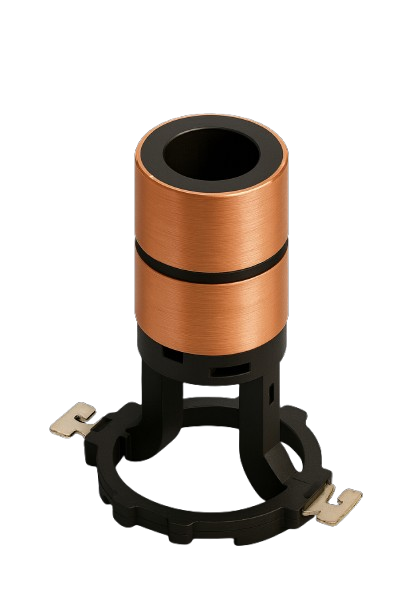
Commutators
Commutators are essential in powering motors for applications in automotive, appliances, power tools, and industrial machinery.
Overview

Commutators have been a crucial component in motor development since the early 19th century, playing a vital role in the practical application of DC motors. By reversing the direction of current in the motor’s windings, commutators ensure the continuous rotation necessary for smooth operation. This simple yet powerful innovation made DC motors viable across a wide range of applications, from early machines to today’s cutting-edge technologies.
Traditionally made from copper segments, commutators are fundamental to industries that rely on motors, including automobiles, appliances, power tools, and a variety of industrial use cases. In the automotive industry, for instance, commutators are key to the smooth operation of electric motors in everything from window regulators to fuel pumps. In power tools, they are responsible for the efficiency and durability of electric drills, saws, and grinders, ensuring these tools can handle rigorous demands. Appliances such as washing machines and vacuum cleaners also depend on commutators for their reliable and long-lasting motor performance.
At Nisiki, we specialize in manufacturing riser and hook-type commutators. Both types are designed to optimize performance and durability based on the specific requirements of the application. The riser-type commutators are typically used in high-power motors where increased current capacity and heat dissipation are essential. Hook-type commutators, on the other hand, are known for their robust construction and efficiency, making them ideal for motors used in appliances and power tools.

Applications of Commutators
I. Automotive

In the automotive sector, commutators are found in several motors within a vehicle. We make commutators across the board, but specialise in starter motor commutators.
- Starter Motors: Commutators in starter motors enable the conversion of electrical energy into mechanical motion, allowing the engine to start.
- Radiator Fan Motor: The commutator controls the fan's speed, ensuring efficient cooling of the engine based on temperature needs.
- Blower Fan Motor: Commutators regulate the speed of blower fans, providing controlled airflow in the vehicle's HVAC system.
- Windshield Wiper Motor: Commutators ensure smooth, controlled movement of the windshield wipers for clear visibility.
- Window Lift Motor: Commutators allow precise control of the window’s up-and-down movement.
- Seat Adjustment Motor: The commutator ensures smooth, accurate seat positioning for user comfort.
- Mirror Adjustment Motor: Commutators enable precise movement of side mirrors for optimal driver visibility.
- Door Lock Motor: Commutators control the motor that locks and unlocks vehicle doors reliably.
- Washer Pumps: The commutator ensures steady operation of washer pumps, delivering fluid to the windshield.
II. Appliances
In the appliances sector, commutators are primarily used in devices that rely on electric motors for their operation. These motors, typically DC motors or universal motors, require commutators to convert electrical energy into mechanical motion. Here are some common household appliances where commutators are used:
- Vacuum Cleaners: The motors in vacuum cleaners use commutators to provide high-speed rotation, driving the suction mechanism for effective cleaning.
- Blenders and Mixers: Universal motors with commutators are used in kitchen appliances like blenders and mixers, enabling high torque at varying speeds for chopping, blending, or mixing food.
- Washing Machines: The motor in many washing machines relies on commutators to switch current, ensuring smooth and efficient operation of the drum for washing and spinning clothes.
- Hair Dryers: Hair dryers utilize universal motors with commutators to run the fan at high speeds, directing airflow for drying hair quickly.
- Vacuum Pumps: In appliances requiring vacuum technology, such as certain kitchen tools (e.g., food sealers), motors with commutators help generate the suction necessary for operation.
- Juicers and Food Processors: Commutated motors are also common in high-power kitchen equipment like juicers and food processors, where variable speed and torque control are required.
- Coffee Grinders: Coffee grinders often use commutators in their motors to power the blades that grind coffee beans to the desired consistency.
III. Power Tools
Commutators in power tools provide precise speed, torque control, and smooth operation, enabling efficient performance in various tasks.
- Drills: Commutators allow precise speed control and torque in power drills for efficient drilling operations.
- Angle Grinders: Commutators regulate the motor’s speed, ensuring smooth operation in cutting, grinding, or polishing tasks.
- Electric Saws: Commutators control the motor’s rotation, providing the necessary power for cutting through various materials.
- Sanders: The commutator enables consistent motor performance, allowing for smooth sanding on different surfaces.
- Impact Wrenches: Commutators ensure the motor delivers high torque for tightening or loosening bolts quickly.
- Rotary Tools: Commutators provide fine control of speed and power, allowing precision in tasks like carving, engraving, and polishing.
- Cordless Screwdrivers: Commutators enable efficient operation of the motor for fast and smooth screw driving.
- Planers: Commutators in planers ensure accurate and smooth cutting for wood surface finishing.
- Nail Guns: Commutators control the motor’s movement, enabling quick and precise nail firing in construction or carpentry tasks.


.png)
.png)
